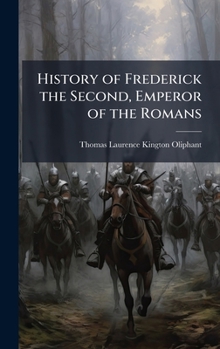History of Frederick the Second, Emperor of the Romans
"History of Frederick the Second, Emperor of the Romans" explores the life and times of one of the most fascinating and controversial figures of the Middle Ages. Drawing upon chronicles and documents published within the last ten years before its writing, this historical work by Thomas Laurence Kington-Oliphant delves into the complex political landscape of 13th-century Europe. Frederick II, Holy Roman Emperor, was a man of immense intellect and ambition, whose reign was marked by constant conflict with the papacy and involvement in the Crusades.
This biography provides a detailed account of Frederick's interactions with popes, kings, and other powerful figures, offering insights into the political and religious tensions of the era. It sheds light on Frederick's cultural interests and his impact on the development of the Holy Roman Empire. A valuable resource for students and enthusiasts of medieval history, this book offers a window into a pivotal period of European history.
This work has been selected by scholars as being culturally important, and is part of the knowledge base of civilization as we know it. This work was reproduced from the original artifact, and remains as true to the original work as possible. Therefore, you will see the original copyright references, library stamps (as most of these works have been housed in our most important libraries around the world), and other notations in the work.
This work is in the public domain in the United States of America, and possibly other nations. Within the United States, you may freely copy and distribute this work, as no entity (individual or corporate) has a copyright on the body of the work.
As a reproduction of a historical artifact, this work may contain missing or blurred pages, poor pictures, errant marks, etc. Scholars believe, and we concur, that this work is important enough to be preserved, reproduced, and made generally available to the public. We appreciate your support of the preservation process, and thank you for being an important part of keeping this knowledge alive and relevant.





